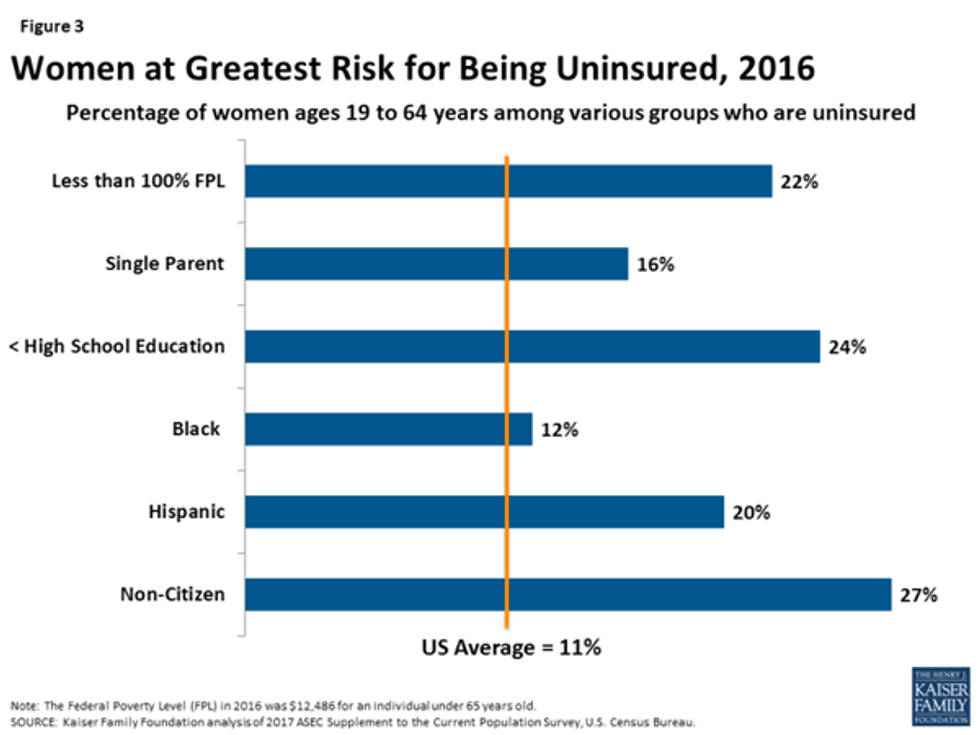May 16, 2018
To ensure that American families and communities continue to prosper, the health and well-being of all women and their families must be a priority. Health care disparities between racial or ethnic groups for such basic health measures as birth outcomes, death rates from cancers, HIV infections and prevalence of high blood pressure and diabetes are unacceptable.
More action must be taken to help all women and communities be healthier and more robust places for their residents to live, play, work and thrive.
During National Women's Health Week, and as part of HealthyWomen's ongoing work to promote prevention with our #KeeptheCare campaign, we are calling attention to health and wellness challenges unique to minority women.
Consider these troubling healthcare disparities:
-
Black and Hispanic women are less likely to have health insurance (see chart below).
-
Black women are 90 percent more likely to have diabetes than white women.
-
Hispanic adults are 60 percent more likely to have diabetes than white adults.
-
Black women are 40 percent more likely to die of breast cancer than white women.
-
Black women have cervical cancer rates that are 30 percent higher.
-
Black women are 15 times as likely to be infected with HIV as white women.
-
Black women are 18 times more likely to die from HIV.
-
Hispanic women have HIV infection rates that are three times higher than for white women.
-
Black women are 30 percent more likely than white women to have uncontrolled high blood pressure.
-
Children born to black women have infant mortality rates 2.3 times higher.
-
Perinatal death rates for Hispanic women are more than 50 percent higher than for white mothers.
Many of the diseases and conditions that excessively affect minority women are targeted by the preventive services and screenings that health insurance is required to provide without charge under the Affordable Care Act (also known as Obamacare). That is one of the reasons HealthyWomen's #KeeptheCare campaign continues to support maintaining those insurance benefits. With our partners, we are connecting with women to educate them about the preventive health services they are entitled to by law.
At a congressional briefing May 18, one of our partners, Care Women Deserve, is highlighting the critical importance of preventive care services. Earlier this spring, another HealthyWomen partner, the Black Women's Health Imperative, convened a congressional briefing that included patients and other experts, along with Senator Doug Jones from Alabama, Congresswoman Robin Kelly from Illinois and Congresswoman Bonnie Watson Coleman from New Jersey. The briefing addressed the lifesaving importance of maintaining no-cost screening and preventive services for women and the challenges minority women often face in the health care system.
A must read for everyone concerned with health disparities is The New York Times article about mortality for black women and infants, “Why America's Black Mothers and Babies Are in a Life-or-Death Crisis,” which noted that severe complications from high blood pressure in pregnancy occurs 60 percent more often in black women.
Progress can be made in women's health and disparities if we keep fighting for improvements—but improvements will not occur in silence. HealthyWomen, along with our partners and allies in government and across the advocacy community, will continue to beat the drum of awareness and action for access to preventive health measures that will help reduce health disparities for women and their families. In the coming months and years, HealthyWomen will work to expand its voice and help you use yours more effectively.
Source: https://www.kff.org/womens-health-policy/fact-sheet/womens-health-insurance-coverage-fact-sheet/








